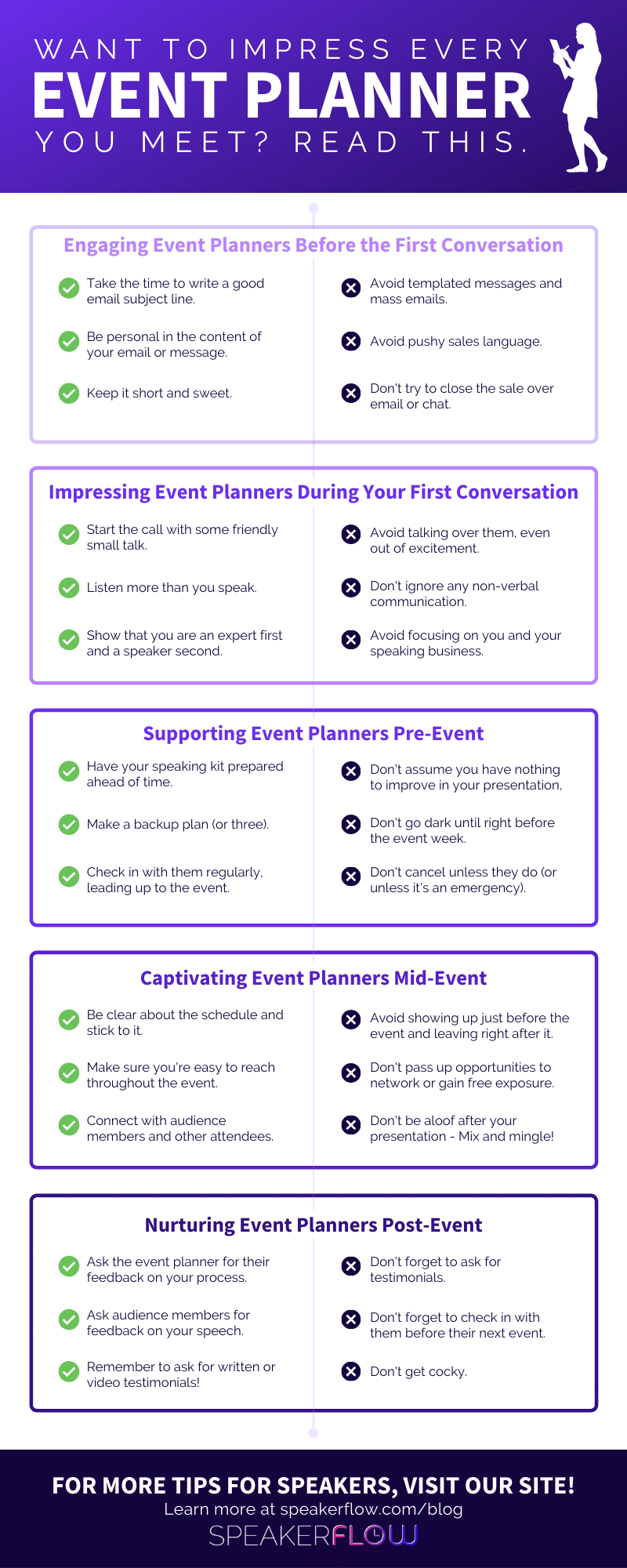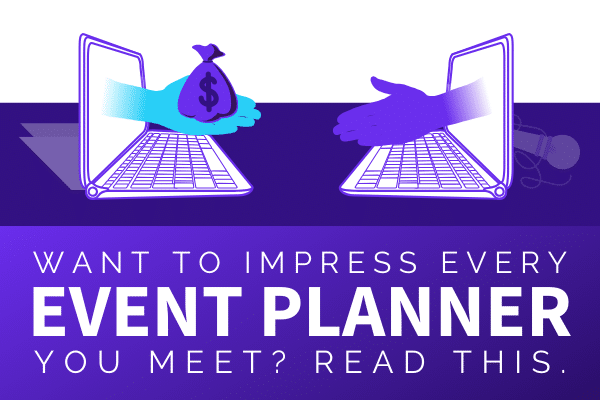In many ways, learning to sell is a bit of a numbers game. While there are proven techniques that make sales easier, it’s also a given that you have a greater chance of making sales if you talk to a greater number of people. This is partly because of the variety of people you’re going to meet. However, it’s also because, the more experience you have, the more you learn what works and what doesn’t. In the speaking industry, this can be a tough road to navigate as a new speaker, as every meeting with an event planner is an opportunity to make the money you need to grow your speaking business. When that opportunity is lost, it can be hard to see the conversation as a learning experience rather than money lost down the drain.
Thankfully, if you’re a new speaker or if you’re simply looking to boost your sales game this year, this guide is your ticket past all these losses. Since we launched SpeakerFlow in 2019, we’ve been collecting all of the do’s and don’ts of event planner conversations. From new speakers, sharing their struggles, to experienced speakers, sharing their victories, we’ve spent countless hours collecting as many speaker-specific sales tips as we can get our hands on. Now, in this guide, we’re putting them all in a quick and simple handbook for a successful sales process, from start to finish. Below are the five main parts of the sales timeline we’re going to cover.
Engaging Event Planners Before the First Conversation
To start with, before you can win event planners over, you have to first get their attention. For many speakers, this part of the process is the most difficult. After all, in some cases, an event planner receives upwards of 50 sales emails from speakers, all of whom want to speak for their event. That means, even if you have a lot of speaking experience, you’re likely still competing with plenty of others similar to you. Because of that, you not only need to get them to open your first email or message. You need them to say, “Ooo this person sounds awesome! I want to learn more!”
What to Aim For
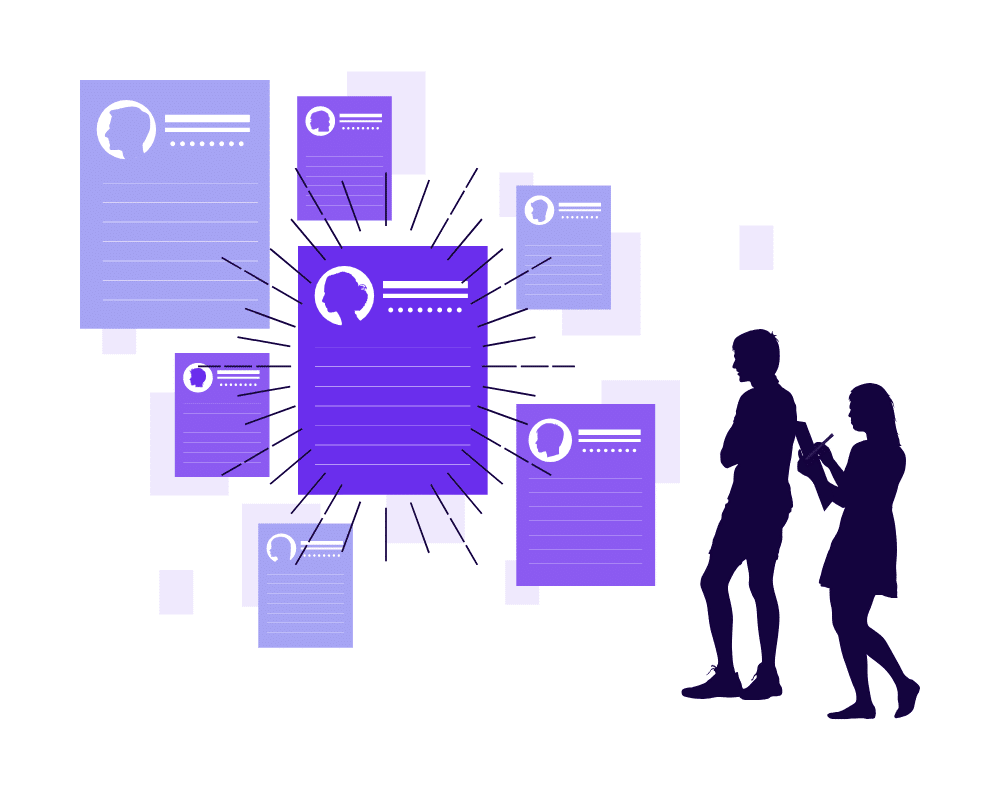
First, for emails, make sure to write a good email subject line. I know everyone loves to throw around the old phrase, “don’t judge a book by its cover,” but the fact is that people still do. In the case of emails, if your subject line doesn’t appeal to the event planner you’re contacting, they’re not even going to open your email. To solve this, there are countless tactics you can use, including piquing their curiosity, alluding to a free or discounted offer, or relating your email to a trending topic. For a few examples, and to see these tactics in action, I recommend checking out Sleeknote’s list of “The 115 Best Email Subject Lines We’ve Ever Seen” and OptinMonster’s blog article, “164 Best Email Subject Lines to Boost Your Email Open Rates”.
Second, after the event planner has opened the email, keep things personal. From your subject line to the content of your email, the event organizer should be able to see you for who you are and they should understand that you’re not trying to be a pushy salesperson. This also rings true for messages through LinkedIn, if you’re going that route. In short, keep it personal and honest, always.
Third, keep it brief. Just as you wouldn’t read a five-paragraph essay sent to you over email or chat, an event planner doesn’t want to read anything longer than a few sentences. By keeping it short, you’re inadvertently demonstrating, to the event planner on the other side, that you respect their time enough to not bullsh*t them. Remember, the goal of the email or message is to introduce yourself, gain their interest, and get them into a conversation. From there, you can push your sale a little harder.
What to Avoid
Overall, when working to get an event planner’s attention, there are two things to avoid at all times. The first is giving the impression that they are just another sale for you, a contact in your CRM. For example, we’ve all been on the receiving end of an email that begins with “Hello, Sir/Madam” and was clearly sent to a list of people. As a speaker, you can avoid sending an email like this by showing your personality and by including details that make it clear you’ve already done some digging into the event in question and the group hosting it.
The second thing to avoid in emails or messages to event organizers is overly pushy sales tactics. The most common of these are declarative statements or phrases like “should,” “have to,” or “need to”. When any of these are used, not only do you come across as a salesman, rather than a speaker. You also sound condescending and a little judgemental, even if you don’t mean to. In light of that, in addition to the do’s we covered above, avoid making the message about you and focus on how you can help them. Ultimately, the goal is to show your value but also show that you’re there to help them, not sell them a product that doesn’t necessarily work, just to make a few bucks.
Impressing Event Planners During Your First Conversation
After booking your call with an event planner, the next step is to nail your conversation with them. When it comes to this step, there’s a general divide between speakers. For some, it’s the easiest part of the process, as they know they can win anyone over once they get them in a conversation. For others, however, it’s incredibly stressful, mainly because of the “money” part of the conversation. Either way, regardless of the category into which you fall, there are definite things that will help the entire exchange run more smoothly.
What to Aim For
First, start the call with some normal back and forth. Besides introducing yourself, ask a few friendly questions, such as “How was your weekend?” or “How has your week been so far?”. My personal favorite, during the winter, is “So, where are you calling from today? I’m in Minnesota, so I’m always curious about the weather in places a little less intense than here.” Essentially, you’re just being a human and showing, again, that they’re not just a sale for you.
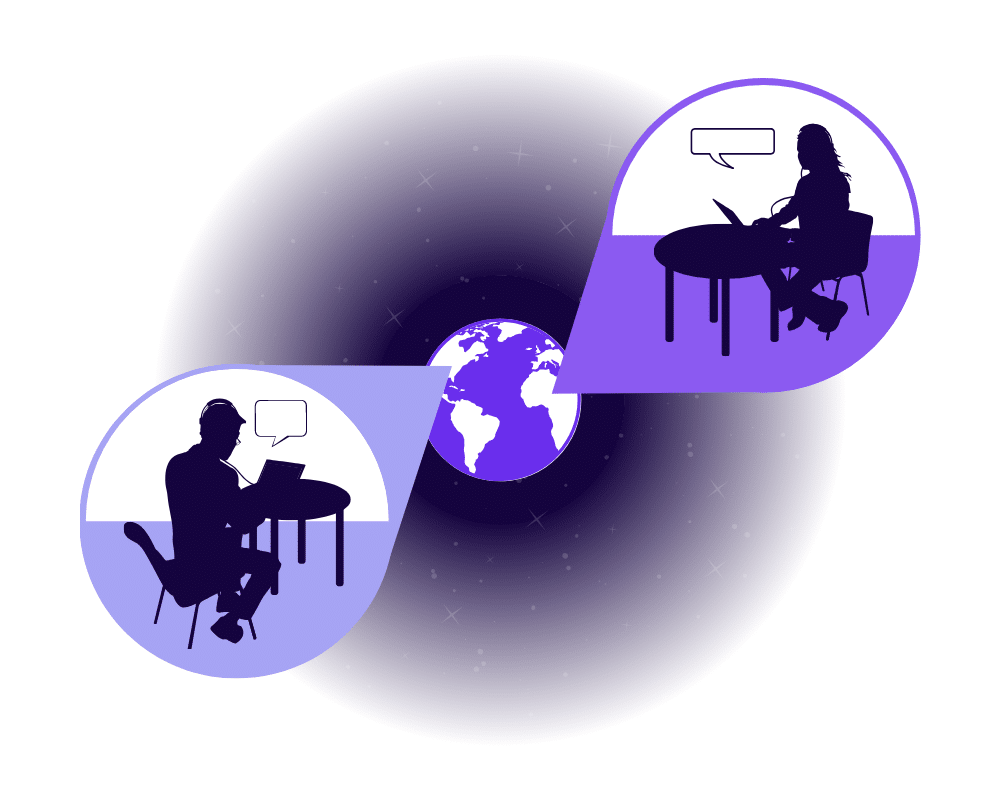
Second, listen more than you talk. Before, I mentioned tailoring your email to focus on the event planner you’re contacting rather than you, and your conversation with them is your chance to expand upon this. Mention that you already know some details about the event but you want to learn more about it. Ask questions about the company hosting the event, what challenges they’re facing, and what they ultimately want to gain from hiring a speaker. All in all, you want to learn as much as you can about the event planner you’d potentially be working with and their needs. That way, you can not only show that you’re there to be of service, while in conversation. You’ll also be able to adjust your presentation to be more specific to the audience’s experiences and goals, making it more impactful in the long term. Win, win!
Third, be confident in yourself. Even if this conversation is for your first event, be confident in your skills and in the fees you charge for them. Remember, you are an expert on your topic and in your focus industry, and the speaking aspect of your career is a vehicle for your insights. In other words, you are an expert first and a speaker second. Your conversation should reinforce that.
What to Avoid
Throughout your conversation, there are a handful of don’ts to keep in mind, too, if you want to win the event planner over. An obvious one is not paying attention to their mood or personality. For example, if you’re loud and flamboyant with an introverted event planner, they might feel overwhelmed or misunderstood. If they’re giving clear indicators that they don’t think you’re a good fit but you push on, you’re going to lose any chance you have at getting hired for a different one of their events. To put it simply, you want to observe their behavior and then mirror it, to as great an extent as you’re comfortable. That way, you build a layer of trust between you and help bring the event planner to the conclusion that you’re a good fit for their event.
Other than that, again, avoid focusing on you and your services during the conversation. Admittedly, it can be tempting to jump into “Here are all the ways I can help!” and “Here are some clients that love me!”. However, when you skip over what they are looking for, what they can afford, and what they ultimately need out of the event, you reinforce any fears they may already have that you’re just looking for a sale. In the conversation, it’s your job to show that you care, you’re there to serve, and if they don’t end up hiring you, you’re okay with it because you genuinely want what’s best for their event.
For more tips on handling your conversation with an event planner, check out our Sales Script Guide. Inspired by Laurie Guest‘s guide, “Sweet Spot Pricing: How to Close Deals You’ve Been Missing,” it’s full of advice specific to this step in the sales timeline. 👍
Supporting Event Planners Pre-Event
At this point, give yourself a pat on the back. You’ve made the sale! That said, one of the biggest mistakes that speakers make is considering this step the point at which they can step back from the event planner and focus more on their presentation material. However, supporting your client as they prep for their event doesn’t just make you a gem in their eyes. It also can give you a ton of insights as to how your client’s company or organization operates and the challenges they’re facing, giving you a ton of ammo for tailoring your presentation to them specifically. Because of this, if you’re taking your foot off the gas, don’t. There are plenty of ways to maximize this time for your (and your client’s) benefit.
What to Aim For
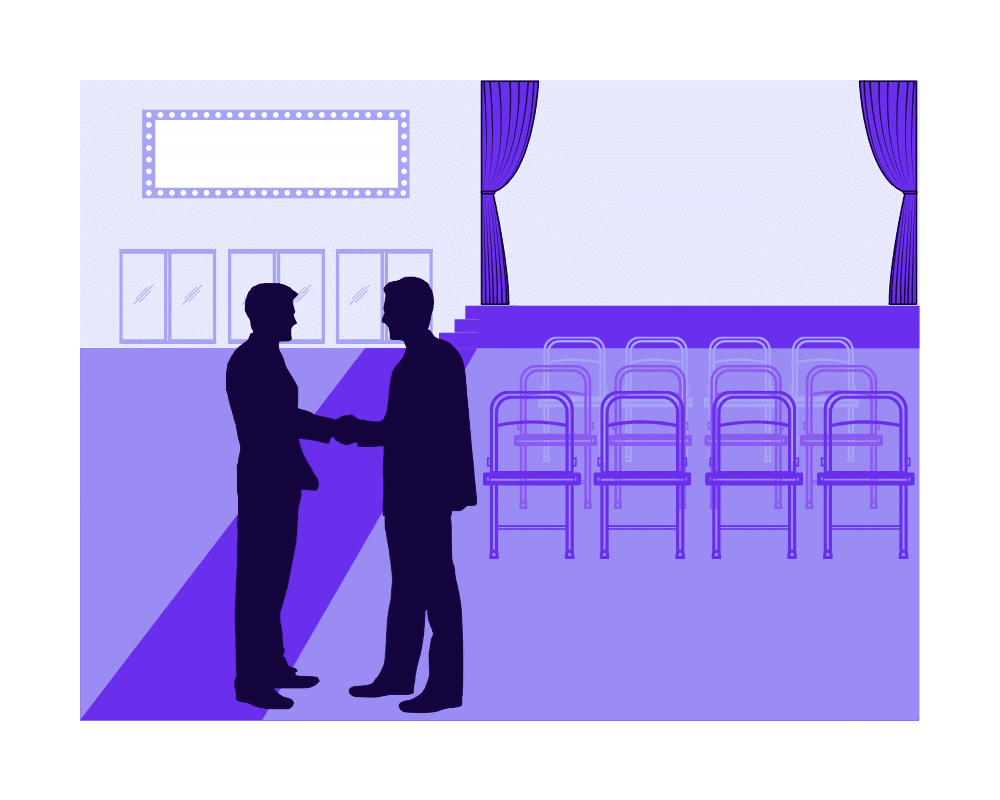
First, show off your organizational skills. Does the event planner need your headshot? Check. How about your list of A/V requirements? Check. Oh! And your biography? Double-check. In short, if you’ve had to provide a piece of info to an event planner in the past, compile it into a “speaker kit”. Then, before each event, make sure the planner has ample time to look it over and let you know if they need anything else. Ideally, at this point, they’ll just say, “No, it looks like you covered everything!” making the planning that much easier for them and quicker for you.
Second, prepare for the worst, but hope for the best. When it comes to technology, it seems to either work flawlessly or be a huge pain. Considering that, when preparing for an event, make sure to have a couple “backup”s for your presentation. Generally, within the SpeakerFlow team, we recommend having a copy on your laptop, a copy in the Cloud (we’re fans of Google Drive), and a copy on a flash drive, at a minimum.
Third, check-in regularly with the event planner, leading up to the event. Ideally, your presentation should be relevant to their group’s concerns as well as current events, so making sure you’re in the loop is key. That way, if something dramatic happens within the host organization (CEO is caught in a scandal, merger becomes a possibility, etc.), you can adjust your presentation well ahead of time and stay on the same wavelength as your audience.
What to Avoid
As far as pre-event “don’t”s are concerned, there really isn’t a lot to say that isn’t terribly obvious. In light of that, if you’re an experienced speaker, you likely already know the following tips. However, if you don’t, below are the main things to avoid as you prepare for each event.
First, don’t assume your presentation is perfect, even if you’ve given it before. No matter how many times you’ve delivered it, I guarantee there is a way you can make it better for this time around. This also goes for the physical component of your presentation. Take it from me, as SpeakerFlow’s content and graphic design manager – A little design updating can go a long way.
Second, don’t check in with the event planner immediately after you close the sale and then fall off the radar until a week before the event. Not only will that likely result in you being unprepared. It’s also incredibly rude to the event planner.
Third, don’t cancel after you’ve already signed a contract with an event planner, just because a more lucrative speaking opportunity came along. Unless the first event is canceled, commit to it. If anyone approaches you afterward, with an offer on the same date, tell them that you’re already booked but you’d love to recommend someone else and speak at their next event. Then, go back to focusing on the event at hand.
[hubspot type=cta portal=5815852 id=7cff95fd-a207-455b-aed4-9364f424f159]
Captivating Event Planners Mid-Event
During the event, obviously, your main priority is to do what you do best: speak! That said, during your time off-stage, there are countless things you can do to provide value for the event planner and ensure that, if there’s any part of the event that goes wrong, it’s not anything that involves you. That way, not only will you leave a lasting impression on the audience, by way of your presentation. You’ll also leave behind a client that truly enjoyed working with you and is likely to recommend to other event organizers they know.
What to Aim For
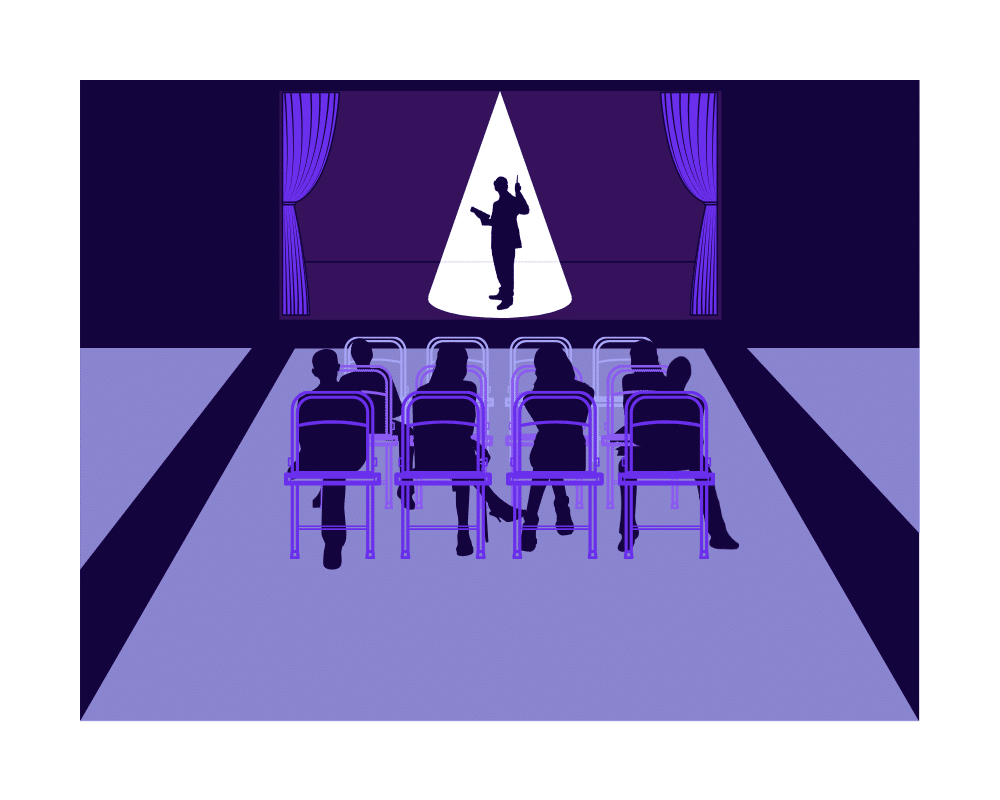
First, be punctual (and detailed about it). Before leaving, make sure the event planner knows exactly when you are arriving and departing and that those times leave some “wiggle room,” in case something throws a wrench in the works. Additionally, many speakers also recommend arriving up to a day early, if possible. This gives you time to explore the venue a bit and get a feel for your stage before the pressure of the event is on.
Second, make sure the event planner has your mobile phone number. The last thing you want is to be unreachable when the room you’re speaking in changes at the last minute. Plus, being easy to reach is just another way to show the event planner that you are there for them. Even though, yes, you’re getting paid and that’s important, you’re ultimately there to help their organization and you want just as much as they do for everything to go smoothly.
Third, and lastly, take some time to mix and mingle! After your presentation is over, connecting with members of the audience or other event organizers doesn’t just make you look more relaxed and approachable, as a speaker. It also, in many cases, opens the doors for further speaking engagements. This is especially true for association events, where many audience members are also business owners or executives who could hire you for their own events. What’s not to love about that? 🙌
What to Avoid
On the flip side, during the day of the event, be mindful of the things to avoid, as well. Of these things, the first relates to timing. Unless you have an emergency or another event to get to, avoid the “fly-in-deliver-the-speech-and-leave” approach to speaking. Besides having the opportunity to connect with audience members that could turn into clients, sticking around also shows the event planner your humility. In other words, if you’re not on the same speaking level as Richard Branson or Bill Gates, recognize that and don’t give the impression to your clients that you have somewhere more important to be.
Additionally, even if you’re not leaving right away, don’t be inflexible with your time. Although you can build them into your pricing structure, hanging out after your speech for videos, podcasts, or interviews isn’t just a way to support the event planner. It’s also a great way to gain exposure without having to do too much work. Really, when it comes down to it, appearing on someone else’s website or social media accounts is a simple and effective way to get in front of a new audience without having to do anything but talk for a little while.
Nurturing Event Planners Post-Event
At this point in the sales timeline, we are almost to the end of your interaction with the event planner. The event is over, you’re on your way home (if it’s a live event), and you’re already mentally preparing for your next gig. However, there are still a few things to do that can wrap your just-completed event up in a nice, neat package. All of these, while they can seem superfluous, are key if you want your client to feel taken care of and if you want a good review. Sounds like a good way to end things, right?
What to Aim For
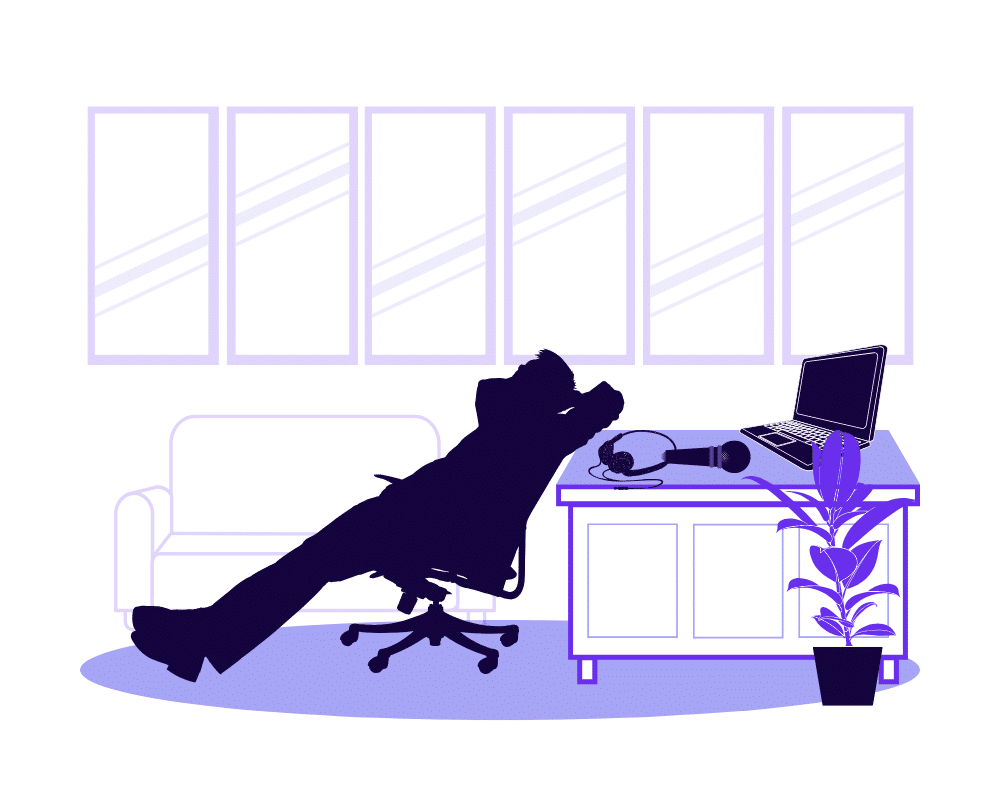
First, follow up after the event is over to get the event planner’s feedback. Was there anything you could have done to make the prep work easier to manage? What did they think went well during and after your presentation? Was there anything they would change about your interaction with the audience? Whatever your question and no matter how well the event went, your goal is to stay humble and always work to be better the next time.
Second, make sure to ask for audience feedback. This component of the “winding down” period is especially important, as the more you positively impact your audiences, the more easily you’ll be able to sell to event planners in the future. If there are things they would improve, great! That just means additional information to make your next speech better. If they’re all smiles, awesome! See if they’re willing to submit a testimonial for your website.
Speaking of testimonials, that brings me to the last tip for ending an event on a high note: remember to ask for reviews! In the end, the greatest selling point for your speaking business isn’t what you think you can do for others. It’s what others are proud to say you did for them. Because of that, the more social proof you can get (Google reviews, Facebook reviews, written and video testimonials, etc.), the more easily you’ll be able to prove your worth to potential clients down the line.
What to Avoid
Last but not least, after the event is over, there are still a few pitfalls to avoid, if you want to end the sales process on a good note. Most of them are pretty straightforward, like “Don’t forget to ask for testimonials” or “Don’t forget to check back in with them before their next event, since you already have a foot in the door”.
However, I would argue that above all, don’t forget to be grateful for each and every event. No matter how much experience you have, as a speaker, a quick “Thank You” note after each event is a simple and personal way to show the event planner that you appreciate their time as well as the opportunity to share your knowledge. After all, the speaking industry is full of talented speakers with valuable things to say. If you want to stand out from them and impress event planners time and time again, one sure way to do so, besides the tips we’ve already covered, is to stay humble and kind. 💓
For more information about sales in the speaking industry, check out our Ultimate Sales Guide for Professional Speakers. See also our previous list of “5 Reasons Meeting Planners Aren’t Hiring You And How To Reverse Them” so you can make sure you’re on the right track.
